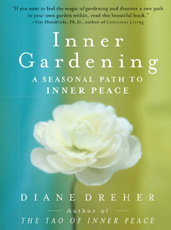"The art of gardening, of participating in the annual cycle of the seasons and watching things grow, has become a perennial source of peace, inspiration, and personal renewal," writes Diane Dreher who teaches Renaissance literature and creative writing at Santa Clara University. The author of The Tao of Inner Peace finds that this activity slows us down and teaches us patience and perseverance. Best of all it is a nurturing process that involves us in inner and outer caretaking. Or as Joseph Addison put it: "I look upon the Pleasure we take in a Garden as one of the most innocent Delights in human life." This is only one of the many quotations from medieval and Renaissance poets garnishing the text.
From the earliest subsistence gardens of 7,000 years ago to the medieval pleasure gardens, the seventeenth century devotional gardens, and the modern "show" gardens of suburbia, human beings have always enjoyed this connection to the earth and this opportunity to witness growth. Whether you have a small herb garden or a lavish cutting garden to provide beautiful flowers for your house, you will enjoy Dreher's ability to relate composting, watering, weeding, mulching, sowing, pruning, and fertilizing to the spiritual ideals of renewal, balance, order, patience, presence, attention, and care.
Inner Gardening is organized around the four seasons with checklists of things to do and tasks to perform. In our era when multitasking is the norm and incessant activity is the name of the game, the garden is one of the few places on earth where one can do one thing at a time — and that is one of its appeals. It also has the added value of teaching us to be "mindful of small things." Dreher tutors us in all these delights in this edifying and inspirational work.
